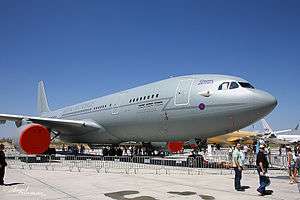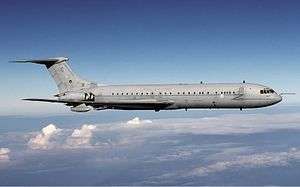Future Strategic Tanker Aircraft
| Future Strategic Tanker Aircraft | |
|---|---|
 | |
| Royal Air Force Airbus A330-203 at Airbus factory of Getafe, Spain | |
| Project for | aerial refueling tanker aircraft |
| Service | Royal Air Force |
| Outcome | AirTanker consortium's Airbus A330 MRTT selected |
Future Strategic Tanker Aircraft (FSTA) is a British project to procure Airbus A330 Multi Role Tanker Transport aerial refuelling (AR) and air transport (AT) aircraft for the Royal Air Force, to replace ageing VC10s and TriStars.
After evaluation of bids the RAF selected the AirTanker consortium, owned by Cobham plc, EADS, Rolls-Royce plc, Thales UK and VT Group plc, in 2004 offering the Airbus A330 MRTT.
Background


The project was to provide a replacement of the RAF's fleet of Vickers VC10s from 2008 and the Lockheed TriStars around 2012. The need for a new fleet of air-to-air refuelling aircraft was first identified in 1997. The chosen aircraft were to operate from the same RAF air transport hub, RAF Brize Norton, Oxfordshire as the replaced aircraft.
The use of a Private Finance Initiative (PFI) rather than purchase was chosen in 2000. Under the PFI the RAF will pay for aerial refuelling and air transport missions as required. The RAF will continue to retain responsibility for all military missions, whilst the contractor will own, manage and maintain the aircraft and also provide training facilities and some personnel. The private company will also be able to earn extra revenue by using aircraft for commercial operations when not required by the RAF — the most suitable of which would be leased air-refuelling missions for other European air forces. The RAF however will always have the "first call" on aircraft, being able to mobilise the entire fleet in times of crisis.
Competition
Final bids for the project were received from the two competing consortia on 30 April 2003.[1]
- Air Tanker Ltd offered a mix of new and used Airbus A330-200s, team composed of:
- Rolls-Royce - Trent 700 turbofans
- Cobham - Air-refuelling hose and drogue system
- EADS - Airbus A330-200
- Thales Group - Avionics and training.
- Tanker Transport Services Consortium (TTSC) offered converted British Airways Boeing 767s:
- British Airways - Aircraft
- Boeing - Conversion technology, using the KC-767 as the basis of the design.
- BAE Systems - Conversion of majority of aircraft and mission systems.
- Marshall Aerospace
- Serco
- Spectrum Capital
Selection and contract negotiations
The Ministry of Defence (MoD) announced on 26 January 2004 that Air Tanker had been selected to enter into final negotiations to provide the RAF's FSTA.[2]
Following aircraft selection the MoD began exclusive negotiations with the Airtanker consortium. However, beginning in April 2004, there were rumours about the fragile state of the contract negotiations. With continuing doubts over the FSTA programme, Marshall Aerospace, responsible for the conversion of the RAF's original TriStars, offered to buy and convert some of the large number of surplus commercial TriStars.[3]
On 28 February 2005 the MoD named Airtanker as its preferred bidder for the £13bn contract.[4]
Development
The MoD announced on 6 June 2007 that AirTanker had been given the approval it needed to continue with the project, allowing the company to seek the £2 billion private financing required to begin funding the aircraft. On 27 March 2008, a PFI deal was agreed with AirTanker, worth £10.5 billion over the course of the contract, and will involve 14 converted A330 aircraft being delivered from 2011 and being operated until at least 2035.[5] The contract will be paid for at £390 million per annum. Of this running costs are £80 million and the remainder covers the consortium's financing and profit [6] and the capital cost of the project, including aircraft and infrastructure.[7]
All aircraft will be equipped with a pair of wing-mounted aerial-refuelling pods, while only seven FSTAs will be fitted for centreline flight refuelling units (FRUs); each conversion will take about nine months. The AirTanker facility is based at RAF Brize Norton, where a two-bay hangar and support building will provide a maintenance facility, flight operations centre and office headquarters for the programme.[8]Lufthansa Technik will provide support, repair, and overhaul services.[9]
The first two development aircraft went through a comprehensive military conversion process and initial flight testing programme at Airbus Military’s facility near Madrid. It was intended that the remaining 12 aircraft destined for the FSTA fleet would be converted by Cobham Aviation Services at their facility in Bournemouth,[10] but in June 2012 it was announced that the final ten aircraft would be converted in Spain to ensure that they were delivered on time and to cost.[11] The first aircraft to be converted in the UK arrived at Bournemouth Airport on 26 August 2011. Cobham held a ceremony to formally open the newly refurbished A330 conversion facility in Bournemouth on 2 September 2011. In a naming ceremony at RAF Fairford during the 2011 Royal International Air Tattoo, it was announced that the aircraft will be known as "Voyager" in RAF service.[12]
In November 2010 it was suggested that the French Air Force might buy spare FSTA capacity.[13][14]
The first completed aircraft arrived at RAF Brize Norton in December 2011; after a prolonged certification process, it began training flights in April 2012.[15] Following technical issues with the new Cobham-designed High Speed-Variable Drag Drogue when refuelling the Tornado the drogues on the wing tip pods were replaced in early 2012 with standard Sargent Fletcher drogues, delaying the Release To Service clearance required to conduct Air to Air Refuelling (AAR) operations. Certification was finally granted on 16 May 2013 and the first operational tanker flight launched on 20 May 2013.[16]
By May 2014 nine aircraft had been delivered, completing the "core fleet" of RAF aircraft.[17] The remaining deliveries are to be a "surge capability", available to the RAF when needed, but otherwise available to Airtanker for tasks such as "release to the civil market, less its military equipment or to partner nations in a military capacity with the MoD’s agreement".[17] In June 2014 Thomas Cook Airlines entered into an agreement to lease one of the 5 "surge" aircraft from Airtanker.[18] The aircraft will differ from the Voyager fleet by having 32 more seats, different seats with in flight video, and they will receive Thomas Cook livery.[18]
The Voyager started test flights refuelling the F-35B in 2015, with certification expected by mid-June 2015. This followed the Australian KC-30 variant completing refuelling trials with the F-35A in late 2015.[19]
Financial reviews
A review of the scheme by the National Audit Office (NAO) was published in March 2010, concluding that it did not represent value for money. The NAO decided that mistakes had been made at the beginning of the procurement process, leading to expensive additions to the plans and contract later on.[7]
The Public Accounts Committee found that the aircraft specification did not feature the adequate protection required for flights into Afghanistan, and would therefore mean the Lockheed Tristar would continue to fulfil this role until 2016. This had been caused by the FSTA scheme beginning prior to the commencement of military operations in Afghanistan, and a significant delay in any decision being made on including the required protection systems within the contract.[20]
See also
Notes and references
- ↑ "Future Strategic Tanker Aircraft (FSTA)". webarchive.nationalarchives.gov.uk. Ministry of Defence. Retrieved 12 November 2016.
- ↑ "Airbus lands £13bn MoD contract". BBC News. 26 January 2004. Retrieved 20 June 2012.
- ↑ Winchester Air International January 2009, pp.52—53.
- ↑ "EADS closes in on RAF tanker deal". BBC News. 28 February 2005. Retrieved 30 June 2011.
- ↑ "AirTanker: FSTA preparations on track". Retrieved 16 October 2010.
- ↑ "EADS you lose" In the Back, Private Eye No. 1260
- 1 2 "Ministry of Defence: Delivering multi-role tanker aircraft capability". National Audit Office. 30 March 2010. Retrieved 20 June 2012.
- ↑ "FSTA (Voyager) arrives in the UK for the first time". Retrieved 5 November 2011.
- ↑ "Lufthansa Technik to support UK's FSTA fleet". Retrieved 2010-09-30.
- ↑ "FSTA (Voyager) arrives in the UK for the first time". Retrieved 5 November 2011.
- ↑ Jones, Rhys (22 June 2012). "UPDATE 2-Britain loses Voyager work and 320 jobs to Spain". Reuters.
- ↑ "RAF's largest aircraft Voyager officially unveiled". BBC News. 16 July 2011. Retrieved 16 July 2011.
- ↑ "L'Europe de la défense est franco-britannique - ce n'est pas une première". Retrieved 2010-11-10.
- ↑ "UK–France Summit 2010 Declaration on Defence and Security Co-operation". Retrieved 2010-11-10.
FSTA
- ↑ "Voyager achieves its first flight in RAF service". AirTanker Ltd. 8 April 2012. Retrieved 20 June 2012.
- ↑ Osborne, Anthony (20 May 2013). "AirTanker Cleared To Begin Air-To-Air Refueling Operations". Aviation Week. Retrieved 25 May 2013.
- 1 2 "ZZ338 arrival completes the RAF Voyager core fleet". Airtanker. Retrieved 2 June 2014.
- 1 2 "Thomas Cook to lease A330 from AirTanker". 2014-06-24.
- ↑ Drew, James (21 May 2016). "RAF Voyager begins F-35B refuelling certification". Flight Global.
- ↑ "Delivering Multi-Role Tanker Aircraft Capability". Public Accounts Committee. 16 September 2010. Retrieved 20 June 2012.
External links
- Page about the A330 MRTT on Airbus Military web site
- Air Tanker Limited
- EADS closes in on RAF tanker deal, BBC News